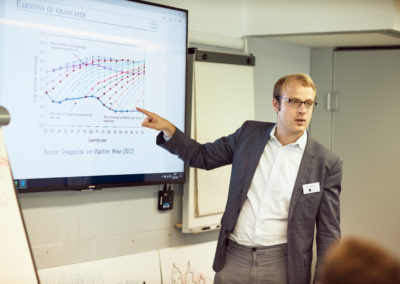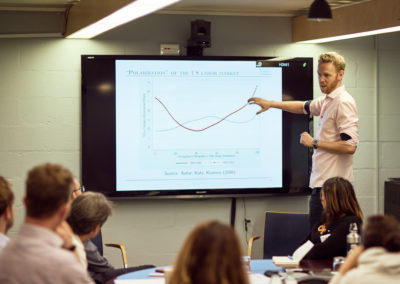Economic growth is hailed as the main driver out of poverty for developing nations. More than half of the fall in the world poverty rate since 2000, when the World Bank launched the Millennium Development Goals can be traced to faster growth (particularly in China and India), rather than to specific government policies to raise the incomes of citizens living below the poverty line. At the same time, inequality levels have risen significantly since the 1990s in both in developing and advanced nations. The forces of globalisation, which pulled world growth everywhere appear to be equally responsive for greater economic cleavages across nations but especially within nations. Inequality in this context is consistent with decreasing overall poverty levels since it is mainly driven by differential trends in income growth and wealth accumulation across the population. Economists such as Thomas Piketty and Emmanuel Saez are the forefront of the studies of modern inequality and of its possible implications for the stability of market economies and liberal politics.
Globalization in general is associated with increasing polarisation of economic outcomes, not only for individuals but also for firms. It is therefore essential to understand what are the sources of growth for modern economies and how they interact with observed levels of inequality. At a very generic level, innovation is the ultimate cause of growth but its benefits are almost never distributed evenly. Eighty or so years ago, Joseph Schumpeter described economic innovation as a process of ‘creative destruction’ littered with economic losers. Nowadays, we speak of technological disruption with profound impacts on established industries and the labour market. The great success stories are those of firms that create new products and needs rather than those that marginally increased the productivity in existing industries. On top of this data shows that there is a greater variation in productivity levels across, say, firms in India than there is between the average Indian firm and the average US company, as reported in official statistics. This led economists such as the 2019 Nobel Laureates in economics, Esther Duflo and Abhijit Banerjee to call for a disaggregated understanding of economic growth, down to the firm level.
The automation of increasing swathes of tasks, combined with the promise of AI to replace jobs involving greater judgement and skills is part and parcel of the modern process of economic growth, but its consequences for the distribution of the fruits of growth are still not well understood. An influential strand of opinion worries about the possible job polarization and the hollowing out of the middle class that may be associated with it. In this context, the work of Angus Deaton (2015 Nobel Laureate) identified a looming poverty trap for large segments of the US labour force. Gender is one of the most important vectors for economic inequality, particularly in developing nations where the gender gap is even more pressing than in high-income countries. The creation of a level-playing field for women in the market is an untapped growth potential with benefits for the whole society. The lectures on this day will cover three topics. We will start by reviewing how technology disruption jumpstarts growth by at the cost of ‘creative destruction.’ In the second lecture, we discuss the consequences of automation for growth and labour market inequality. In the third lecture we will cover the growth potential that can be unlocked through a fairer distribution of market outcomes by the two genders.











